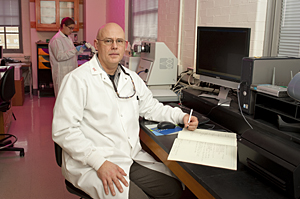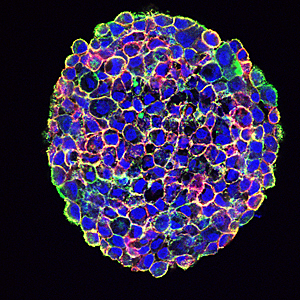

ADVERTISEMENT
- Rozovsky wins prestigious NSF Early Career Award
- UD students meet alumni, experience 'closing bell' at NYSE
- Newark Police seek assistance in identifying suspects in robbery
- Rivlin says bipartisan budget action, stronger budget rules key to reversing debt
- Stink bugs shouldn't pose problem until late summer
- Gao to honor Placido Domingo in Washington performance
- Adopt-A-Highway project keeps Lewes road clean
- WVUD's Radiothon fundraiser runs April 1-10
- W.D. Snodgrass Symposium to honor Pulitzer winner
- New guide helps cancer patients manage symptoms
- UD in the News, March 25, 2011
- For the Record, March 25, 2011
- Public opinion expert discusses world views of U.S. in Global Agenda series
- Congressional delegation, dean laud Center for Community Research and Service program
- Center for Political Communication sets symposium on politics, entertainment
- Students work to raise funds, awareness of domestic violence
- Equestrian team wins regional championship in Western riding
- Markell, Harker stress importance of agriculture to Delaware's economy
- Carol A. Ammon MBA Case Competition winners announced
- Prof presents blood-clotting studies at Gordon Research Conference
- Sexual Assault Awareness Month events, programs announced
- Stay connected with Sea Grant, CEOE e-newsletter
- A message to UD regarding the tragedy in Japan
- More News >>
- March 31-May 14: REP stages Neil Simon's 'The Good Doctor'
- April 2: Newark plans annual 'wine and dine'
- April 5: Expert perspective on U.S. health care
- April 5: Comedian Ace Guillen to visit Scrounge
- April 6, May 4: School of Nursing sponsors research lecture series
- April 6-May 4: Confucius Institute presents Chinese Film Series on Wednesdays
- April 6: IPCC's Pachauri to discuss sustainable development in DENIN Dialogue Series
- April 7: 'WVUDstock' radiothon concert announced
- April 8: English Language Institute presents 'Arts in Translation'
- April 9: Green and Healthy Living Expo planned at The Bob
- April 9: Center for Political Communication to host Onion editor
- April 10: Alumni Easter Egg-stravaganza planned
- April 11: CDS session to focus on visual assistive technologies
- April 12: T.J. Stiles to speak at UDLA annual dinner
- April 15, 16: Annual UD push lawnmower tune-up scheduled
- April 15, 16: Master Players series presents iMusic 4, China Magpie
- April 15, 16: Delaware Symphony, UD chorus to perform Mahler work
- April 18: Former NFL Coach Bill Cowher featured in UD Speaks
- April 21-24: Sesame Street Live brings Elmo and friends to The Bob
- April 30: Save the date for Ag Day 2011 at UD
- April 30: Symposium to consider 'Frontiers at the Chemistry-Biology Interface'
- April 30-May 1: Relay for Life set at Delaware Field House
- May 4: Delaware Membrane Protein Symposium announced
- May 5: Northwestern University's Leon Keer to deliver Kerr lecture
- May 7: Women's volleyball team to host second annual Spring Fling
- Through May 3: SPPA announces speakers for 10th annual lecture series
- Through May 4: Global Agenda sees U.S. through others' eyes; World Bank president to speak
- Through May 4: 'Research on Race, Ethnicity, Culture' topic of series
- Through May 9: Black American Studies announces lecture series
- Through May 11: 'Challenges in Jewish Culture' lecture series announced
- Through May 11: Area Studies research featured in speaker series
- Through June 5: 'Andy Warhol: Behind the Camera' on view in Old College Gallery
- Through July 15: 'Bodyscapes' on view at Mechanical Hall Gallery
- More What's Happening >>
- UD calendar >>
- Middle States evaluation team on campus April 5
- Phipps named HR Liaison of the Quarter
- Senior wins iPad for participating in assessment study
- April 19: Procurement Services schedules information sessions
- UD Bookstore announces spring break hours
- HealthyU Wellness Program encourages employees to 'Step into Spring'
- April 8-29: Faculty roundtable series considers student engagement
- GRE is changing; learn more at April 15 info session
- April 30: UD Evening with Blue Rocks set for employees
- Morris Library to be open 24/7 during final exams
- More Campus FYI >>
11:26 a.m., Jan. 24, 2011----For University of Delaware researcher Kenneth van Golen, the advances made in recent years in treating breast cancer have a bittersweet element.
The disease on which he focuses -- inflammatory breast cancer, or IBC -- is relatively rare, far less studied and much more deadly than the common form of cancer that is the subject of a great deal of scientific research, fundraising drives, media attention and public education campaigns. All those efforts have paid off in earlier detection and more effective treatment for common breast cancer, which affects the largest number of women, and van Golen wholeheartedly applauds the progress that has been made.
At the same time, the associate professor of biological sciences is concerned that less-common breast cancers are not receiving the same kinds of attention. IBC is the opposite of common breast cancer in many ways, he says, including the success of treatment: While common breast cancer now has an 80 percent survival rate, only about 20 percent of IBC patients live more than 10 years after diagnosis.
“I started working with inflammatory breast cancer in 1996, and for a long time, it was a disease that was relatively ignored by researchers,” van Golen says. “Until about 2003, people argued over whether it was even a distinct disease, and the first international conference on it wasn't held until 2008.”
Now, he says, conferences are held regularly, and the one slated for 2012 is to be hosted by UD. Still, he estimates that his lab is one of just one or two dozen worldwide that are devoted to IBC research. And, at the recent San Antonio Breast Cancer Conference, the largest such gathering in the world, he says that of some 2,000 posters on view, only six were on the topic of IBC, with three of those six presented by his own students.
The disease is not only studied infrequently, but it also is often misdiagnosed at first, causing patients and physicians to lose valuable time in beginning to treat the aggressive cancer. Because it accounts for just 1-9 percent of breast cancer cases, and because it resembles an infection rather than a typical cancer, many doctors “haven't seen this disease since medical school,” van Golen says, and try to treat it with antibiotics.
“It has none of the hallmarks of a typical cancer, either in the way it presents or in the types of treatment that are effective,” he says. “When I first encountered this disease, I was told by an oncologist: This is inflammatory breast cancer. It doesn't follow any of the rules.”
Among the differences from common breast cancer, IBC doesn't generally have tumors that can be felt in an exam or detected by a mammogram; it causes redness, soreness and skin changes that make it appear to be an infection; it affects younger women, some as young as teenagers; and it spreads very rapidly through the lymphatic system. Because IBC is systemic, and because it often has progressed before diagnosis, treatment is aggressive and extensive, including surgery, chemotherapy and intensive radiation therapy.
Calling the current treatments harsh and extremely difficult for patients, van Golen says, “Our approach is to figure out molecularly what's going on with this disease and then target specific pathways” to combat it. His lab has collaborated with one in Belgium, which has established the distinctive “molecular signature” of IBC.
His lab is conducting pre-clinical trials with drugs currently used for other types of cancers, including a type of leukemia, and he hopes to partner with cancer treatment centers in the region to conduct clinical trials with patients by 2014.
Meanwhile, the key to fighting IBC is education, van Golen believes. He says that both physicians and women need to recognize the earliest symptoms of the disease and test for it so that treatment can begin immediately and have the best chances of success.
“The community involved with inflammatory breast cancer is very small, so you're immediately not just a researcher but also an advocate,” van Golen says. “Education is the key with this disease. Education will save lives.”
For more information, visit the IBC Foundation website.
Article by Ann Manser
Photo by Kathy Atkinson


